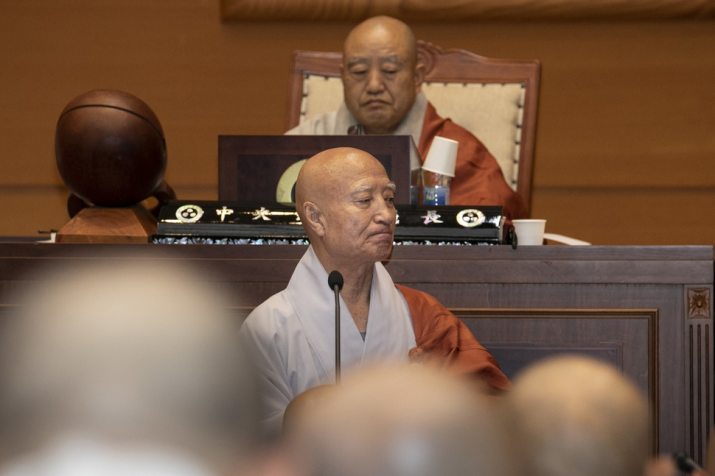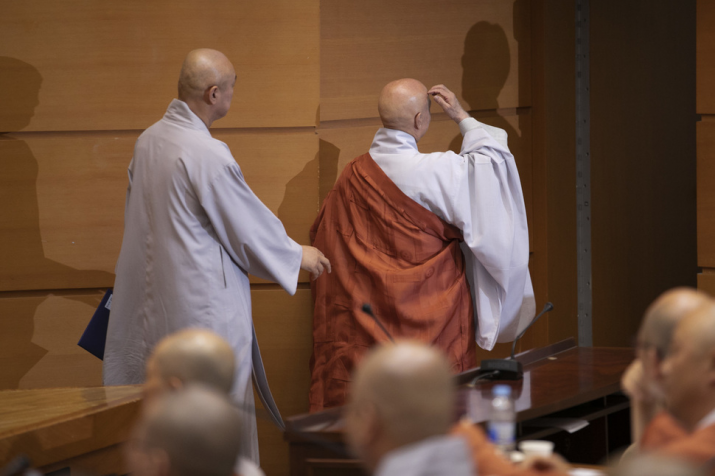NEWS
Head Monk of South Korea’s Jogye Order Steps Down
 Ven. Seoljeong during the executive committee vote last Thursday. From english.hani.co.kr
Ven. Seoljeong during the executive committee vote last Thursday. From english.hani.co.krVenerable Seoljeong, the presiding executive of the Jogye Order of South Korea, the country’s largest Buddhist order, announced yesterday that he would step down after a series of allegations and reversals lead to a vote of no confidence on 16 July by the Jogye Order’s executive council.
“I came forward in order to change Korean Buddhism for the better, but now I will return to the mountains with this goal unattained,” Ven. Seoljeong said during a press conference yesterday at the Jogye Order headquarters in central Seoul. (Korea Joogang Daily)
After the press conference, Ven. Seoljeong, 76, said farewell to the monastics and laypeople at Jogye Temple and then left Seoul for Sudeok Temple in Yesan, South Chungcheong Province, where he once served as abbot before his election as the president of the Jogye Order in October last year. The executive council of the Jogye Order plans to elect a new president in the coming two months.
Ven. Seoljeong has been at the center of a series of scandals that have shaken the reputation of the Jogye Order and have contributed to a crisis within the order. The allegations against the monk include accusations of him forging his academic credentials, misusing and embezzling the order’s funds, and secretly fathering a daughter out of wedlock against the order’s celibacy rule.
While he originally apologized for the scandals and announced his intent to resign on 2 August following heavy criticism from reformist monks and the public, he reversed this decision on 13 August stating that he would remain in office for the remainder of the year to oversee a reform committee tasked with reorganizing the order’s organization.
Although he has admitted to lying about his college degree, Ven. Seoljeong has denied the other charges throughout the proceedings, dismissing them as “groundless” and meant to do him harm.
His resignation comes five days after the order’s executive council passed a vote of no confidence against the monk, with 56 of 75 members in favor of Ven. Seoljeong’s resignation. The decision to impeach Ven. Seoljeong is unprecedented in the history of the organization—the current organizational structure of the order dates from 1962—and will need to be approved by the order’s senior members, who are meeting today. Ven. Seoljeong, however, pre-empted his forced removal by resigning yesterday. The council of senior monks will now meet to approve Ven. Seoljeong’s resignation, after which they have to elect a new executive within 60 days. In the meantime, Ven. Jinwoo, Ven. Seoljeong’s deputy, will preside over the order as acting chief.
 Ven. Seoljeong after the vote last Thursday. From english.hani.co.kr
Ven. Seoljeong after the vote last Thursday. From english.hani.co.krVen. Seoljeong began his four-year tenure as the chief executive of the Jogye Order in November last year. As the executive, Ven. Seoljeong controlled all of the order’s financial and administrative decisions, including the right to appoint and dismiss abbots of its 1,900 active temples, which is why the position is often referred to as the “presidency of the Jogye order”. This vast concentration of power is often cited as one of the reasons for the heightened criticism and renewed allegations against the venerable.
Ven. Seoljeong’s resignation, however, will not end the political crisis within the order as reformist monk are demanding a complete overhaul of the organization to increase the transparency. The Jogye Order has requested that the Korean government not intervene in the internal dispute, citing the separation of church and state laid out in South Korea’s constitution.
The Jogye Order is a school of Seon (Zen) Buddhism that traces its roots back 1,200 years to the Unified Silla (also known as the Later Silla) kingdom (668–935). The Jogye school as a distinct entity emerged in the late 11th century when the monk Bojo Jinul, credited as the school’s founder, sought to combine Seon practices with the theological underpinnings of sutra-based Buddhist schools, including Korean Pure Land Buddhism. The order now represents the largest segment of South Korea’s Buddhist population, administering about 1,900 active temples and more than 13,000 monastics nationwide.
See more
President of Jogye Order steps down over scandal (Korea Joogang Daily)
Buddhist leader resigns over corruption allegations (Yonhaps News Agency)
Executive chief of Korea's largest Buddhist sect shows intent to resign (Yonhaps News Agency)
President of Jogye Order accused of corruption and breaking celibacy vows (Hankyoreh)
Buddhist council votes to remove its president (Korea Joogang Daily)
Jogye Order's council votes to oust scandal-ridden executive chief (Yonhaps News Agency)
The Jogye Order’s crisis (The Dong-A Ilbo)
Reforming Jogye Order (The Korea Times)
Related news from Buddhistdoor Global
Head of Korea’s Jogye Order Reverses Decision to Step Down
Head of Korea’s Jogye Order to Step Down over Corruption Allegations
The Head of Korea’s Largest Buddhist Order Apologizes for Corruption Furor
Jogye Order Of Korean Buddhism To Build Global Meditation Village
Seven Buddhist Mountain Temples in South Korea Receive UNESCO World Heritage Status
Buddhist Monk from South Korea Ventures North to Foster Bilateral Ties
Two Koreas Celebrate Vesak With Joint Prayer
Related features from Buddhistdoor Global
Engaging with Suffering, Realizing Freedom: An Interview with Ven. Pomnyun Sunim
Compassion and Kalyana-mittata: The Engaged Buddhism of Sulak Sivaraksa
Changing Mindsets: Tashi Zangmo and the Bhutan Nuns Foundation














